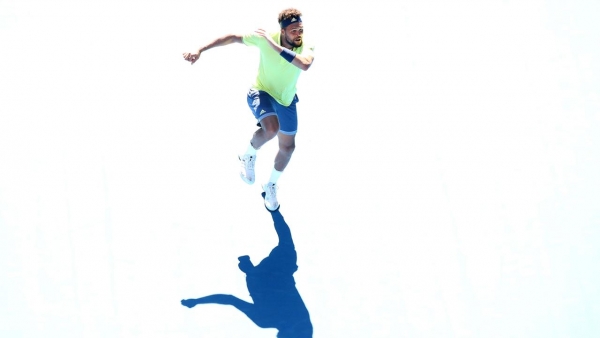At this year’s Australian Open, all eyes are focused on the top two seeds in the men’s draw (Rafael Nadal and Roger Federer), while much of the talk is about the other good old favourites who are as familiar as the furniture at the major events.
Yet sprinkled around and amongst these old faithfuls are the young and the hopeful, the brave and the brash, and all of them want their moment in the limelight. It is like a class full of school swots all trying to get the teacher’s attention: “me sir, me sir, please sir, me sir” they cry with their arms in the air when the merest hint of chance comes their way.
And so it was that Denis Shapovalov, the world No.50 who is barely old enough to buy a beer at the pub, did everything in his power to get the better of Jo-Wilfried Tsonga, but the 32-year-old Frenchman was not to be beaten. Tsonga won 3-6 6-3 1-6 7-6 7-5 on Wednesday, knocking the Canadian out in the second round for the second major in succession after getting the better of Shapovalov in last year’s US Open.
MORE: All the latest scores and results
Many people on a higher pay grade than us are tipping this year as the year of change, the season when the young guys turf the old lads out of their seats at the top of the pile.
The likes of Shapovalov, Alexander Zverev and Andrey Rublev are champing at the bit to make their move towards the very top of the game. Admittedly, Zverev is ranked No.4 in the world and has a couple of Masters 1000 titles to his name, but at the major championships, he has not got beyond the fourth round anywhere on any surface.
For the past 18 months, the ATP has been promoting the new boys with their “Next Gen” campaign. They even gave them their own, end-of-season showcase in Milan last year (and a huge success it was, too). These young men with big ambitions are making waves and are already overtaking the likes of Grigor Dimitrov and Milos Raonic as “the men most likely” to dethrone the old kings.
Tsonga must know exactly how they feel. It was 10 years ago that he reached his one and only Grand Slam final, powering his way through the rounds here only to be squashed by a young Novak Djokovic. Back then, he and his Serbian colleague were the new generation desperate to make their mark.
Djokovic summed it up perfectly that day. He was asked how, as a 20-year-old, he had managed to snaffle one of the biggest prizes in the sport in an era dominated by Messrs Federer and Nadal. The new champion did not miss a beat: “It’s simple,” he said. “I didn’t have to play Roger.”
Tsonga has never reached such heights again, but with his natural power and his willingness to attack, he must be a bugger to play, but is a joy to watch. The Frenchman also has more than a decade of experience behind him, and not even the most precocious talent can trump that.
So here was Tsonga, a mature member of the establishment, trying to swat away this hustling, bustling bundle of energy in the 18-year-old Shapovalov.
For a set, Shapovalov’s shotmaking, speed and sheer chutzpah was too much for Tsonga but then, come the second set, the wily Frenchman slowed things down (none of this rushing between points) and forced the issue. If he could extend the rally, he usually won the point. Shapovalov was great at leathering the ball, but he was just none too sure when to do it. Shotmaking, good; shot selection, not so much. After an hour and a quarter, it was one set apiece.
Even so, the natural talent oozes from Shapovalov, and even if he does make a hash of the occasional point or go for too much of a 50-50 ball (Denis, love: just get the ball back in court; there will be another chance along in a moment), the good far outweighs the inexperience. He gathered in the third set in a brief 26 minutes, and then settled in for some serious graft in the fourth.
Tsonga tried everything he could think of, but Shapovalov would not be beaten. He served, he volleyed, he stood firm at the net and at the baseline and he gave the message to the youngster: I’m a big bloke and you are going to have to run a long way to get round me (or French words to that effect). It was enough to win him the fourth set, but it was not enough to stop Shapovalov sprinting to a 3-0 lead in the fifth.
That was when the experience – or lack of it – kicked in. Tsonga was almost beaten; all Shapovalov had to do was hold serve at 5-3 and a place in the third round was his. And he fluffed it. He played a stinker of a service game and Tsonga’s eyes lit up. As he reeled the young Canadian in, he showed him how it was done: when Tsonga served for the match, he did not allow Shapovalov a single point.
The young guns are coming but, for the moment, experience is holding youth at bay.
